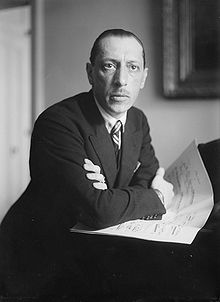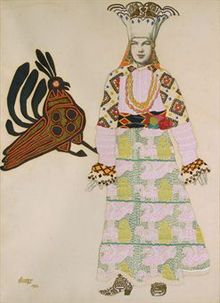- Mavra
-
Igor Stravinsky  Operas
Operas- The Nightingale (1914)
- Mavra (1922)
- Renard (1922)
- Oedipus rex (1927)
- Perséphone (1934)
- The Rake's Progress (1951)
- The Flood (1962)
Mavra is a one-act opera buffa composed by Igor Stravinsky, and one of the earliest works of Stravinsky's 'neo-classical' period. The libretto of the opera, by Boris Kochno, is based on Aleksandr Pushkin's The Little House in Kolomna. Mavra is about 25 minutes long, and features two arias, a duet, and a quartet performed by its cast of four characters. The opera has been characterised as both an homage to Russian writers, and a satire of bourgeois manners and the Romeo and Juliet subgenre of romance. Philip Truman has also described the music as satirising 19th century comic opera.[1] The dedication on the score is to Pyotr Ilyich Tchaikovsky.[2]
Mavra premiered in Paris on June 3, 1922, staged under the auspices of Sergei Diaghilev, with Oda Slobdoskaya among the original cast[3]. The opera was a failure at the premiere, partly because the large space of the Paris Opéra overwhelmed the small scale of the opera.[2]
Stravinsky himself thought very highly of this composition, saying once that "Mavra seems to me the best thing I've done".[4] Erik Satie praised the work after its premiere.[5] Stravinsky himself reacted with hostility to people who criticized it in later years.[6]
The opera was given its United States premiere by the Philadelphia Grand Opera Company at the Academy of Music, Philadelphia on December 28, 1934 with Maria Kurenko as Parasha and Alexander Smallens conducting. The Santa Fe Opera mounted Mavra in 1962.
The first aria of the work has been arranged for cello and piano, and recorded with Mstislav Rostropovich under the title "Russian Song".
Contents
Synopsis
The opera is set in a Russian village circa 1840.
Parasha is in love with her neighbour, Vassili, a young hussar, but they have difficulty in meeting. After they sing a duet, Vassili leaves, and then Parasha's mother enters. She is lamenting the difficulty of finding a new maid-servant after their prior maid-servant, Thecla, died. The mother orders her daughter to find a new maid-servant. Parasha comes up with a scheme to smuggle Vassili into her house disguised as Mavra, a female maid-servant. The ruse initially succeeds, and Parasha and Vassili are happy at being under the same roof. Parasha and her mother go out for a walk. At one moment, Vassili shaves. The ladies return, disconcerted to see their new maid-servant shaving. Vassili escapes out the window, her mother faints, the next door neighbour rushes in to try to help, and Parasha laments the loss of her young love.
Recordings
- Columbia 72609: Susan Belinck, Mary Simmons, Patricia Rideout, Stanley Kolk; CBC Symphony Orchestra; Igor Stravinsky, conductor[7]
- Decca: Joan Carlyle, Helen Watts, Monica Sinclair, Kenneth Macdonald; L'Orchestre de la Suisse Romande; Ernest Ansermet, conductor
- Chandos CHA 9488: Tatyana Kravtsova, Olga Korzhenskaya, Olga Markova-Mikhailenko, Alexei Martynov; Netherlands Wind Ensemble; Thierry Fischer, conductor
- BMC 118: Maria Fontosh, Ludmila Schemtschuk, Lili Paasikivi, Valerij Serkin; German Youth Philharmonic, Gothenburg Symphony; Péter Eötvös, conductor[8]
References
- ^ Truman, Philip, "An Aspect of Stravinsky's Russianism: Ritual" (1992). Revue belge de Musicologie/Belgisch Tijdschrift voor Muziekwetenschap, 46: pp. 225-246.
- ^ a b Robinson, Harlow (1989). "The Case of the Three Russians: Stravinsky, Prokofiev, and Shostakovich.". The Opera Quarterly 6 (3): 59–75. doi:10.1093/oq/6.3.59. http://oq.oxfordjournals.org/cgi/reprint/6/3/59. Retrieved 2007-10-05.
- ^ Elizabeth Forbes, "A soprano's memories" (review of Slobdoskaya by Maurice Leonard). The Musical Times , 120(1640, p. 835 (1979).
- ^ Stuart Campbell , "The 'Mavras' of Pushkin, Kochno and Stravinsky". Music & Letters, 58(3), pp. 304-317 (July 1977).
- ^ Peter Dickinson, Review of The Writings of Erik Satie (translated and edited by Nigel Wilkins). Music & Letters, 63(3/4), pp. 293-295 (July-October 1982).
- ^ Stephen Walsh, Review of Stravinsky and the Russian Traditions: A Biography of the Works Through "Mavra" by Richard Taruskin. Music & Letters, 78(3), pp. 450-455 (August 1997).
- ^ Mellers, Wilfrid, Review of recording of Mavra and The Wedding (1968). The Musical Times, 109 (1500): p. 151.
- ^ Hecht, Rite of Spring; Mavra. American Record Guide; Jan/Feb2007, Vol. 70 Issue 1, p175-176, 2p
External links
- Scholten, Jaroen. 1999. "Mavra". Retrieved January 27, 2006.
- Boosey & Hawkes Opera. "Mavra". Retrieved January 27, 2006.
Categories:- Operas by Igor Stravinsky
- Russian-language operas
- Opera buffa
- One-act operas
- 1922 operas
- Operas
- Paris Opera world premieres
Wikimedia Foundation. 2010.

